Trades business coaching is a tailored approach to help blue-collar business owners, such as plumbers, electricians, builders, and other skilled trades, streamline operations, boost profitability, and achieve sustainable growth.
Unlike generic business advice, it focuses on the unique challenges of trade industries, from managing crews and scheduling jobs to pricing services and handling cash flow. For many tradespeople, it’s the bridge between being great at the craft and running a thriving, scalable business.
Key Takeaways
- Trades business coaching helps blue-collar companies seeking growth.
- Effective coaching equips you with strategic tools tailored for your industry.
- The increase in demand for skilled trades underscores the importance of coaching.
- Entrepreneurial success in trades can be accelerated through specialized guidance.
- Coaching aids in adapting to the complexities of a competitive landscape.
What Is Trades Business Coaching
Trades business coaching helps owners in the skilled trades sector. It offers strategies to improve how your business works and grows. Coaches focus on managing your team and marketing your business in new ways.
Coaching in skilled trades is all about a personal touch. Coaches look at what your business does well and what it could do better. This helps you tackle the special challenges of the trades industry.
Through mentoring, workshops, and online tools, you get help that fits your needs. You learn from experts who know the trades business well. This sets you up for lasting success and better operations.
Importance of Blue-Collar Businesses in the Economy
Blue-collar businesses offer services that keep homes and businesses running. This supports our daily lives. Their role goes beyond just creating jobs; they help keep communities stable and operational.
In tough economic times, skilled labor shines. Tradespeople keep our infrastructure in check, ensuring services keep running.
The demand for trades is growing, showing the blue-collar sector’s economic importance. This field includes traditional jobs like plumbing and electrical work, as well as new areas like renewable energy.
Benefits of Trades Business Coaching
Trades business coaching empowers blue-collar business owners to turn their skills into thriving, sustainable enterprises. They combine practical industry know-how with proven business strategies. Instead of relying on trial and error, owners gain access to tailored guidance that addresses the unique demands of trades work, balancing hands-on craftsmanship with the complexities of running a company. This type of coaching equips tradespeople to overcome common roadblocks, capitalize on growth opportunities, and create a business that works for them, not the other way around.
Key benefits include:
- Improved time management with streamlined schedules, reducing downtime, and ensuring crews are working at maximum efficiency
- Increased profitability through accurate job costing, smarter pricing strategies, and effective cost control measures
- Stronger leadership skills to inspire teams, improve communication, and reduce staff turnover
- Enhanced marketing and sales strategies designed for local markets, helping attract more ideal clients and repeat business
- Better financial oversight with clear budgeting, expense tracking, and cash flow forecasting to prevent costly surprises
- Scalable systems and processes that allow the business to grow steadily without sacrificing quality or burning out the owner
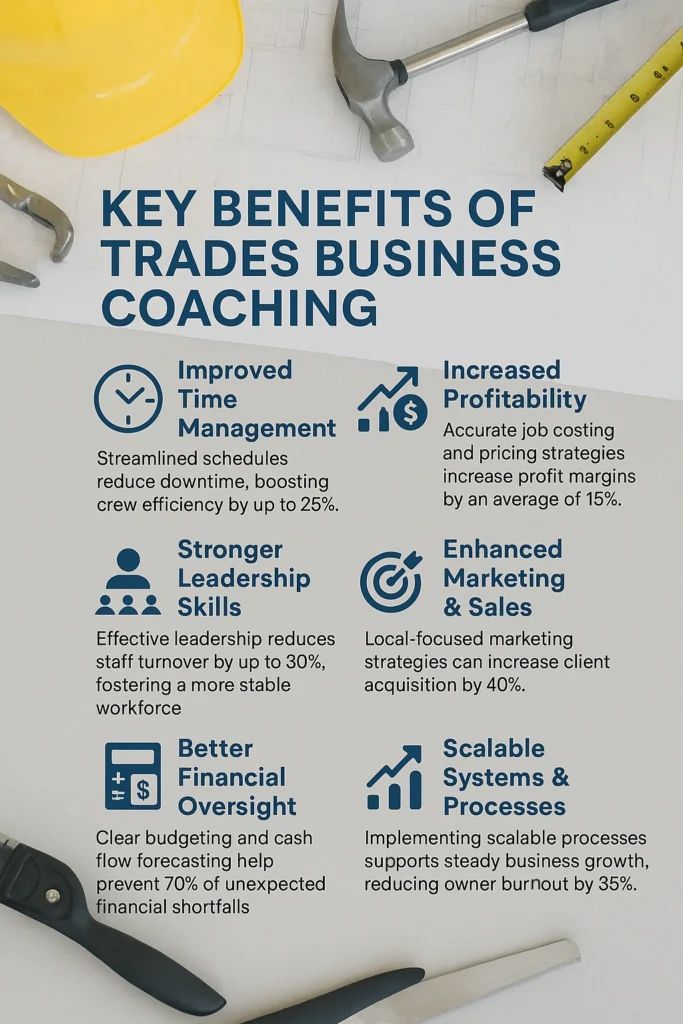
How Trades Business Coaching Addresses Industry Challenges
Trades business coaching addresses industry challenges and breaks them down into manageable steps and offering practical, proven solutions that fit the day-to-day reality of running a blue-collar business.
Instead of applying generic business advice, coaching focuses on the operational, financial, and leadership hurdles that tradespeople face, such as seasonal demand, labor shortages, inconsistent cash flow, and tight project deadlines. Through personalized strategies, it equips owners with the skills, systems, and confidence needed to overcome these barriers.
The process typically includes:
- Identifying core challenges and analyzing current business operations, financial health, and workflow bottlenecks to pinpoint what’s holding growth back
- Setting clear, measurable goals that align with the owner’s vision, whether that’s increasing profit margins, expanding the client base, or improving work-life balance
- Developing streamlined operational systems to improve job scheduling, crew coordination, inventory management, and client communication
- Implementing financial management practices such as accurate job costing, cash flow forecasting, and expense tracking to ensure long-term stability
- Enhancing leadership and team management skills to build trust, boost productivity, and create a motivated workforce
- Creating targeted marketing and sales strategies tailored to the local market and trade niche, ensuring a steady flow of quality leads
- Establishing scalable growth plans so the business can expand without overextending resources or compromising service quality
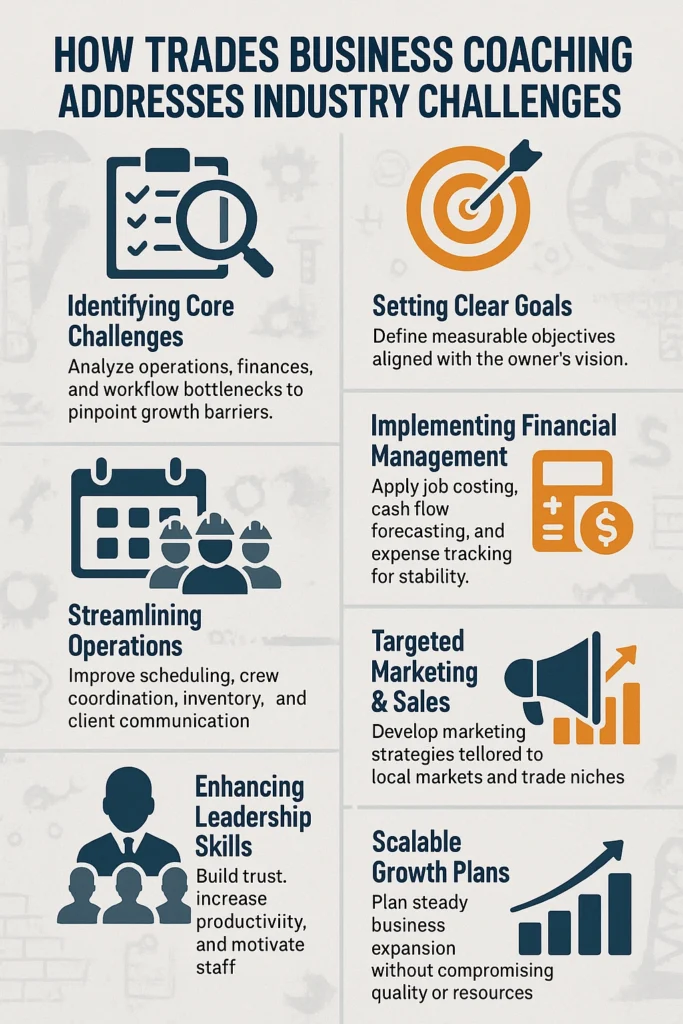
Business Coaching vs. Traditional Business Consulting
Coaching helps you grow and empowers you, the business owner. This leads to better skills and confidence in making decisions.
Coaching is about working together to grow personally and professionally. It’s different from consulting, which often feels one-sided. With coaching, you and your coach tackle challenges and opportunities together.
Coaching offers specific help for blue-collar challenges. It helps you adapt and be creative, keeping up with changes and meeting customer needs. This is unlike consulting, which focuses more on analysis and reports.
The Role of Technology in Trades Business Coaching
Technology enables blue-collar businesses to operate more efficiently, stay organized, and make data-driven decisions. Coaches help trades business owners understand how to leverage technology to overcome common industry challenges and streamline their day-to-day operations. From simplifying job management to improving financial oversight, the right tech tools become powerful assets that support growth and professionalism.
Specifically, technology impacts trades business coaching in several ways:
- Job and Project Management Software: These platforms help schedule jobs, assign tasks to crews, track progress in real time, and manage deadlines, reducing miscommunication and delays on site.
- Customer Relationship Management (CRM) Systems: CRMs enable businesses to track leads, manage client interactions, and automate follow-ups, which improves customer retention and drives repeat business.
- Financial Management Tools: Technology helps automate invoicing, expense tracking, and cash flow monitoring, giving owners clear visibility into profitability and helping prevent costly financial surprises.
- Inventory and Equipment Tracking: Digital tools monitor stock levels and equipment maintenance schedules, reducing downtime caused by missing materials or unexpected breakdowns.
- Mobile and Cloud-Based Solutions: These allow crews and managers to access important information from anywhere, facilitating communication between office staff and field teams and ensuring everyone stays aligned.
- Data Analytics and Reporting: Technology provides actionable insights and analyzes operational and financial data, enabling business owners to identify trends, spot inefficiencies, and make informed strategic decisions.
The right tech adoption helps transform complex, manual processes into streamlined workflows, freeing owners to focus on growing their business and delivering high-quality service.
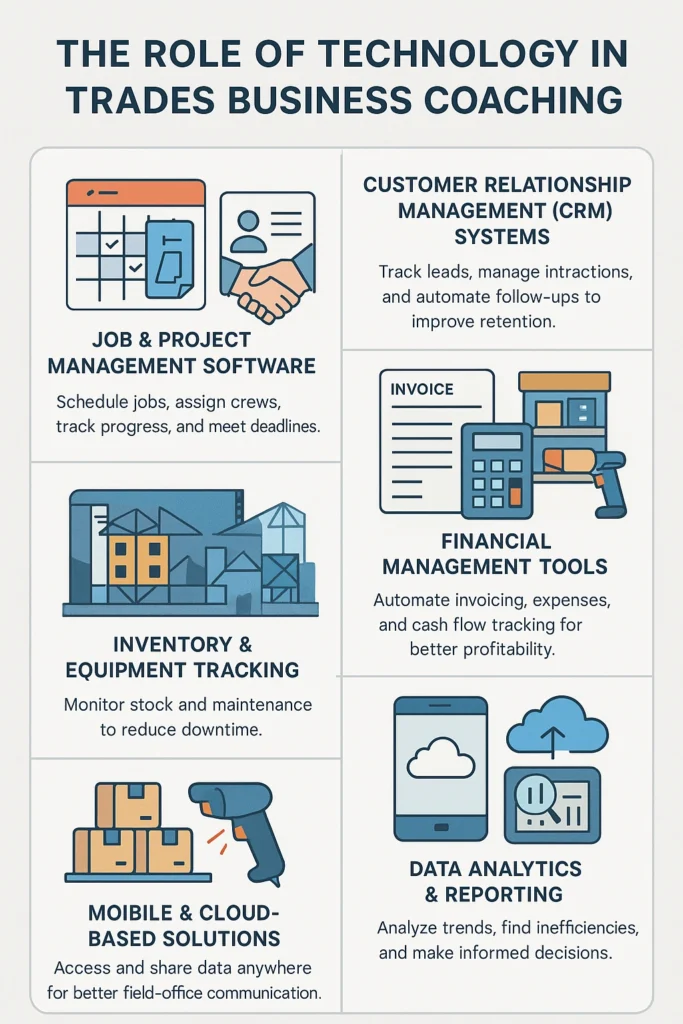
How Coaches Help With Financial Management
In trades business coaching, financial management is one of the most critical areas where coaches provide value, as many blue-collar business owners excel at their craft but lack the tools and strategies to keep their finances healthy and predictable. A coach helps transform financial management from a reactive, stress-driven process into a proactive, strategic function that supports long-term growth. This involves not only understanding the numbers but also using them to make informed business decisions. Coaches typically assist in several ways:
- Assessing the Current Financial Health: Reviewing income, expenses, and profit margins to identify leaks, inefficiencies, or missed opportunities.
- Implementing Accurate Job Costing: Ensuring every project is priced to cover materials, labor, overhead, and a healthy profit margin, preventing underquoting.
- Establishing Cash Flow Forecasting: Creating systems to predict incoming and outgoing cash, reducing the risk of payment delays or seasonal slowdowns causing financial strain.
- Improving Invoicing and Collections: Setting up efficient invoicing systems and follow-up processes to ensure faster payments and healthier cash flow.
- Budget Creation and Tracking: Helping owners set realistic budgets for operations, marketing, and growth investments, then monitoring performance against those budgets.
- Identifying Growth and Investment Opportunities: Using financial data to decide when to hire more staff, invest in equipment, or expand services without overextending resources.
With a coach’s guidance, trades business owners gain clarity over their finances, the confidence to make informed decisions, and the stability needed to weather industry fluctuations while planning for sustainable growth.
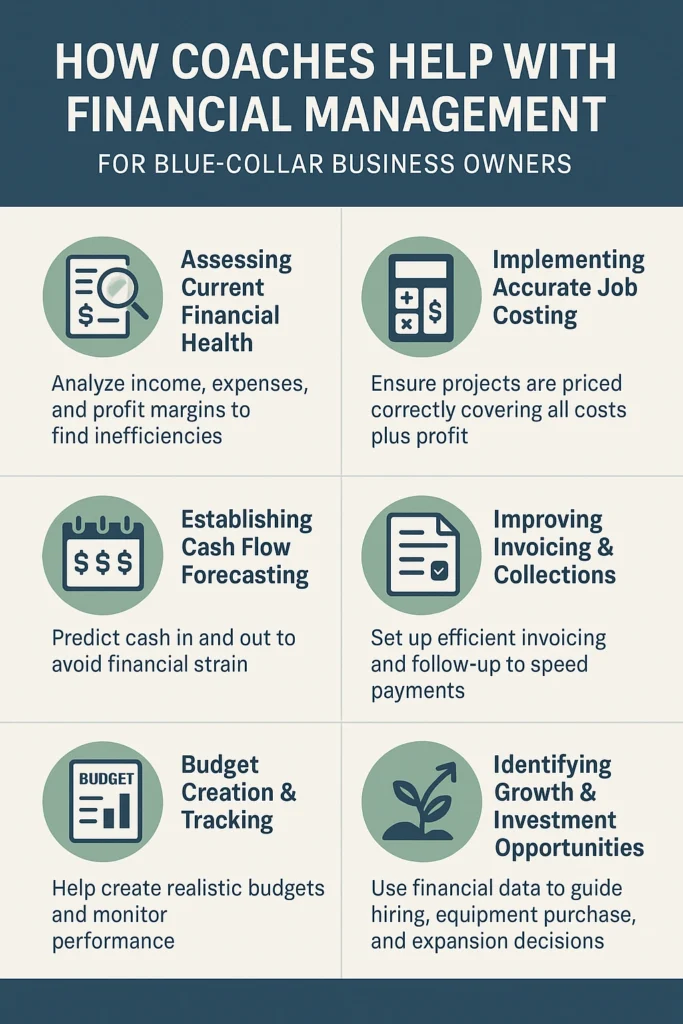
Choosing the Right Coach for Your Trade Business
Choosing a trade coach is a big decision. You need to look at several important factors. First, check if the coach has experience in the trades. A coach who knows the trades can offer valuable advice.
Also, find a coach who matches your business goals. Think about their coaching methods and how they fit with your goals. For example, if you want to improve efficiency, find a coach with a focus on that.
A coach who works the way you do will help you more. This makes the coaching fit for trades better.
Here are some key things to think about when picking a trade coach:
- Experience in the trades sector
- Coaching style and methodology
- Personal compatibility and rapport
- Track record of success with similar businesses
- Understanding of your specific goals and challenges
| Criteria | Importance | What to Look For |
| Experience in Trades | High | Familiarity with industry challenges and solutions |
| Coaching Style | Medium | Alignment with your preferred learning and growth approach |
| Personal Compatibility | High | Strong connection and trust built over time |
| Track Record of Success | High | Proven results with businesses in your trade |
| Understanding of Goals | Medium | Recognition of your unique business objectives |
Carefully choose a trade coach. The right coach can help your business grow. They will give you the skills you need to succeed in the trades.
Scale Your Trades Business with Natalie Luneva and DepositFix
Scaling your trades business becomes much more achievable with the combined expertise of Natalie Luneva and the powerful tools offered by DepositFix. Natalie’s coaching focuses on building efficient systems, leadership skills, and operational clarity tailored specifically for blue-collar service businesses.
Meanwhile, DepositFix automates and streamlines financial and administrative processes, integrating seamlessly with popular CRMs and accounting software. Together, they create a comprehensive support system that helps trades businesses improve cash flow, reduce manual workload, and focus on growth. This partnership ensures you have both the strategic guidance and the technology needed to scale confidently and sustainably.
Key features and benefits include:
- Automated Invoicing & Payment Processing: Simplifies billing cycles, accelerates payments, and reduces administrative errors.
- Seamless CRM & QuickBooks Integration: Keeps customer and financial data synchronized, saving time and preventing mistakes.
- Customizable Workflows: Tailored automation that fits the unique demands of your trades business operations.
- Strategic Business Coaching: Personalized guidance from Natalie to improve leadership, team management, and operational efficiency.
- Improved Cash Flow Management: Real-time tracking and forecasting to help you plan for growth without financial stress.
- Scalable Systems: Build processes that grow with your business, avoiding burnout and operational chaos.
Together, Natalie Luneva and DepositFix empower trades business owners to move from firefighting daily issues to focusing on strategic growth and lasting success.
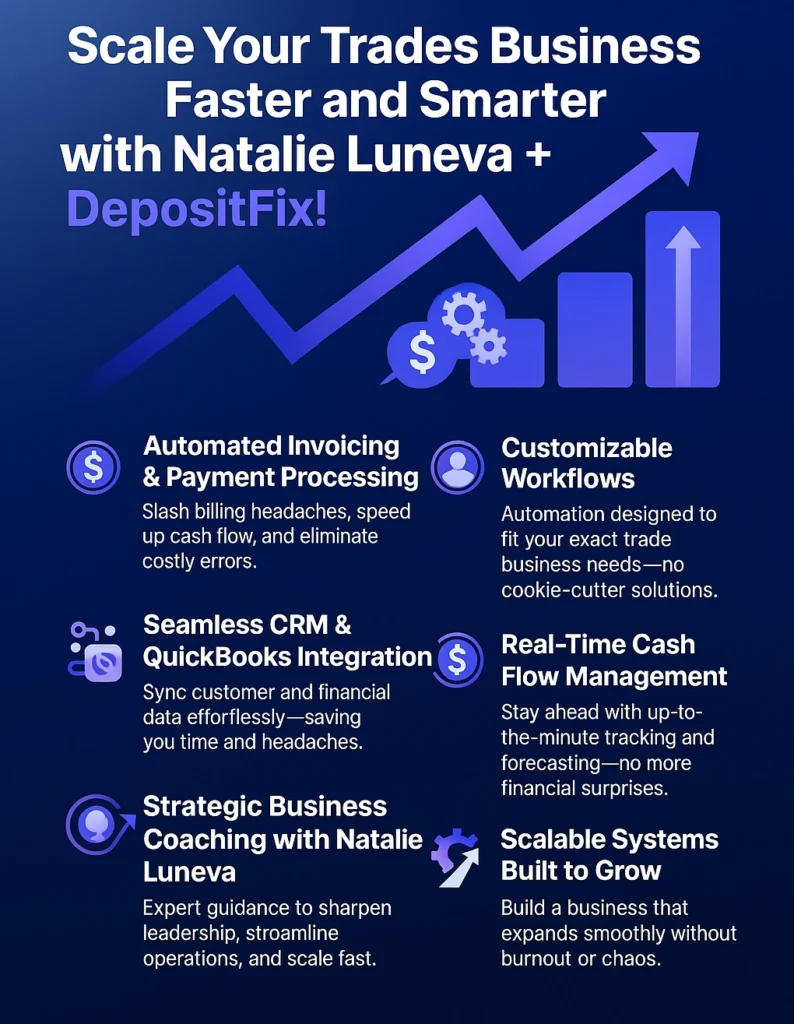
Conclusion
Trades business coaching offers blue-collar business owners a powerful way to overcome industry challenges and unlock lasting growth. Coaching combines practical, trade-specific strategies with personalized support and helps owners improve operations, strengthen leadership, manage finances wisely, and attract more clients.
In an industry facing labor shortages and increasing competition, investing in coaching is a smart move to build a resilient, scalable business. Whether you’re just starting out or looking to take your established trades company to the next level, the right coaching can make all the difference in turning your skills into sustained success.
FAQs
What types of trades businesses benefit most from business coaching?
Trades business coaching is valuable for a wide range of blue-collar sectors including plumbing, electrical, HVAC, carpentry, landscaping, roofing, and general contracting. Any trades business aiming to improve operations, grow revenue, or build stronger teams can benefit, regardless of size or specialization.
How long does trades business coaching typically last?
The duration varies depending on your business goals and needs. Some owners work with coaches for a few months to address specific challenges, while others engage in ongoing coaching for a year or more to support sustained growth and continuous improvement.
Is trades business coaching suitable for startups or only established businesses?
Coaching is beneficial for both startups and established businesses. For startups, it helps set strong foundations in operations and marketing. For established businesses, coaching focuses more on scaling, improving profitability, and overcoming growth challenges.
How much does trades business coaching typically cost?
Costs vary widely depending on the coach’s experience, program length, and services offered. Some coaches charge hourly rates, while others offer package pricing. Look at coaching as an investment that can yield significant returns through business growth.
Can technology integration be part of trades business coaching?
Yes, many coaches incorporate technology recommendations and help implement tools like job management software, CRMs, and accounting integrations. This helps automate routine tasks and improve data accuracy, freeing up time to focus on growth.
How do I measure the success of trades business coaching?
Success can be measured through various key performance indicators such as increased revenue and profit margins, improved cash flow, reduced operational inefficiencies, higher employee retention, and better customer satisfaction scores. Regular progress reviews with your coach help track these outcomes.


